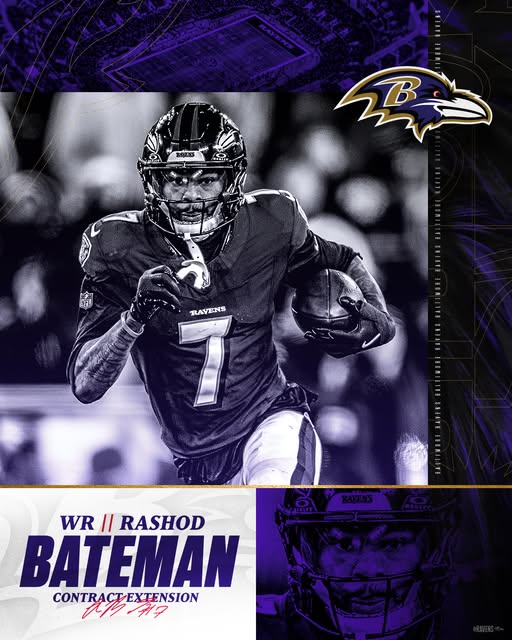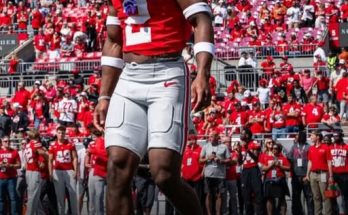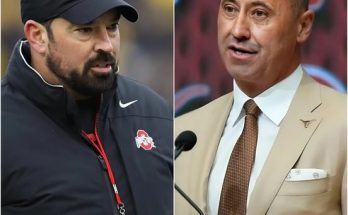When a team decides to extend a player’s contract, it’s never a decision made lightly. It involves evaluating a multitude of factors such as the player’s current performance, potential future contributions, fit within the team’s system, leadership qualities, and overall value relative to salary cap considerations. In the case of Rashod Bateman, the decision to grant him a contract extension is both strategic and forward-thinking, underscoring why it makes so much sense from multiple perspectives.
First and foremost, Rashod Bateman has proven himself to be a dynamic and reliable playmaker at the wide receiver position. Drafted with high expectations, Bateman has steadily demonstrated the talent and work ethic needed to translate his college success into impactful performances on the professional stage. His ability to create separation, run crisp routes, and make contested catches makes him a valuable weapon in any offense. Over his time in the league, Bateman’s consistent improvement has shown that he is not only capable of producing at a high level but is also likely to become a cornerstone receiver for years to come.
In today’s NFL, wide receivers who can reliably produce big plays and stretch defenses are among the most valuable assets a team can have. The position has evolved beyond just speed; route precision, versatility, and football IQ have become equally important. Bateman embodies these qualities. His polished route running allows him to exploit defensive weaknesses, while his strong hands and physicality enable him to make difficult catches in traffic. Moreover, Bateman’s ability to adapt to different offensive schemes and quarterback styles demonstrates a maturity and football acumen that bodes well for his long-term success.
From the team’s standpoint, securing Bateman through a contract extension is a smart move to maintain continuity and build around a core group of players. In the NFL, the window to compete for championships is often short, and having dependable, talented players locked in for multiple years allows the front office and coaching staff to construct their roster with a clear vision. Bateman’s extension not only rewards his current production but also sends a positive message to the locker room that the team values loyalty, hard work, and potential.
Financially, extending Bateman makes sense because it allows the team to manage its salary cap efficiently. While rookie contracts come with cost control benefits, the transition to veteran deals is inevitable for players who prove their worth. By negotiating an extension, the team can structure the contract to fit their cap situation, potentially avoiding a more expensive franchise tag or bidding war in free agency. Extensions also provide a degree of certainty—both the team and the player gain clarity on their relationship moving forward, which can positively impact performance on and off the field.
Another critical factor is Bateman’s potential for growth. Many players show flashes of brilliance but struggle to maintain consistency or develop further. Bateman, however, has shown a trajectory of steady improvement, making him a safer investment than many of his peers. His work ethic, combined with the guidance of veteran teammates and quality coaching, suggests that his best years are still ahead. For a team aiming to compete at the highest level, locking in a player entering his prime years is a strategic necessity.
Beyond the tangible on-field benefits, Rashod Bateman’s extension has intangible value. Leadership and character often influence decisions about extensions, as teams seek players who contribute positively to team culture. Bateman’s professionalism, resilience in overcoming injuries, and commitment to continuous improvement make him an ideal figure for younger players to emulate. This leadership quality can help foster a winning environment that transcends individual statistics.
From a fan engagement perspective, extending a promising player like Bateman helps maintain excitement and optimism around the team. Fans appreciate seeing their favorite players rewarded for hard work and dedication, and extensions often serve as a signal that the franchise is invested in long-term success. Bateman’s potential as a future star enhances the team’s marketability, merchandise sales, and overall brand.
Critically, the timing of the extension is also crucial. Waiting too long to negotiate could lead to a situation where the player enters free agency, potentially driving up costs or risking the loss of the player altogether. Conversely, extending Bateman while he is still developing ensures the team can negotiate from a position of strength. This timing maximizes value while reducing uncertainty, which is particularly important given the ever-changing dynamics of NFL rosters.
Comparisons to other wide receivers around the league further highlight the wisdom of extending Bateman. Teams that have successfully retained their key offensive weapons have generally enjoyed more sustained success. Conversely, franchises that lose talented receivers due to contract disputes or poor timing often experience setbacks. Bateman’s extension helps the team avoid the pitfalls of losing a player who could otherwise become a cornerstone of their offense.
Additionally, the extension enables the team to plan around Bateman in terms of offensive strategy. Knowing that Bateman will be a fixture in the lineup allows coaches to design plays that capitalize on his strengths. This continuity can translate to better offensive cohesion, more explosive plays, and ultimately more wins. It also benefits the quarterback, who can build trust and chemistry with a consistent receiving target, leading to improved overall team performance.
Injuries are an ever-present risk in football, and Bateman has faced some challenges in that regard. However, the fact that the team still chose to extend him underscores their confidence in his ability to stay healthy and contribute long term. Modern medical and training advances reduce the likelihood of injury setbacks lasting over the course of a contract, and the team’s medical staff likely played a significant role in assessing Bateman’s durability. This calculated risk is part of why the extension makes sense—the potential rewards outweigh the inherent uncertainties.
It is also worth considering the broader competitive landscape. With many teams vying for the top talent at the wide receiver position, securing Bateman helps the team maintain a competitive edge. The NFL is a league where the difference between contenders and also-rans often comes down to the quality and depth of skill position players. By locking up Bateman, the team strengthens its foundation for the future and signals to competitors that it is committed to sustained excellence.
In conclusion, Rashod Bateman’s contract extension is a logical, well-considered decision that benefits both player and team. It reflects Bateman’s proven ability as a playmaker, his potential for further growth, and the team’s desire to build a competitive roster with a clear identity. Financially and strategically, the extension provides stability and cap flexibility, while culturally, it promotes leadership and loyalty. Fans have every reason to be excited about what Bateman can achieve in the years ahead, and the extension is a clear sign that the team shares that optimism. For all these reasons, the decision to extend Rashod Bateman’s contract makes a great deal of sense, positioning both player and franchise for a successful future.



